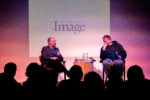The Means of Healing: A Conversation with Martha Serpas
By Interview Issue 111
Becoming involved in a poem, allowing the lines to unfold, not knowing if there’s going to be a surprise, a turn, or deepening—this is very similar to being with a patient or family as a chaplain when I don’t have all the answers. Part of my job is to sit with them in uncertainty. It’s a big white space.
Read MoreThe Strange Persistence of Religion in Contemporary Art
By Interview Issue 110
We’re talking here about two projects: rereading art history to recover a wider context for religious meaning, and rereading it to recover a wider sense of the art historical project. You are aiming at the first, which is the larger and more important one, but our examples have been mainly the second, which would be a tonic to the discipline.
Read MoreA God Who Wails and Dances: A Conversation with Yvonne Adhiambo Owuor
By Interview Issue 109
My first sense of the sea was that briny scent, the waves teal and tinged with white froth, and they hurled themselves into this pristine white sand. As far as a child can have a transcendent experience, this was it.
Read MoreGo Back and Fetch It
By Interview Issue 108
“Literature…can hold up those things that mainstream society doesn’t believe: that Black people are there. One of my jobs is just holding that up to the light so that everyone can see that they’re there.”
Read MoreField of Encounter: A Conversation with G.C. Waldrep
By Interview Issue 107
It is one thing to write an inspirational poem about the raising of Lazarus, from this great distance in time and space, and another to be Lazarus: to be the one who is raised. I think any genuine religious art leads the reader (and presumably the writer) to a place of encounter, an encounter with radical otherness.
Read MoreA Devotional Temperament: A Conversation with Garth Greenwell
By Interview Issue 106
One of the extraordinary accomplishments of the Confessions is to find a syntax that doesn’t deny impasse or dilemma, but that also doesn’t allow impasse or dilemma to become stagnant.
Read MoreA Conversation with Randall Kenan
By Interview Issue 48
I wanted to break down part of the Gospel story. As I see it, it’s not just about the son sacrificing himself and all those dynamics that inform the biography. I wanted to look at the messages in the Gospels that haunt our lives. What would we do in this world with someone who could perform miracles—verifiable, right-in-front-of-your-eyes miracles? It would just blow the top off the joint. But at the same time, I’m sure we’d find some way to commodify it.
Read MoreA Conversation with Diane Glancy
By Interview Issue 105
Diane Glancy is professor emerita at Macalester College in Saint Paul, Minnesota, where she taught Native American literature and creative writing.She has published more than sixty books of poetry, fiction, and nonfiction, as well as screenplays and plays—and increasingly, as in her new book, Island of the Innocent: A Consideration of the Book of Job (Turtle Point, 2020),…
Read MoreA Conversation with Lorna Goodison
By Interview Issue 104
Laughter is one way in which I experience God, and so I want to write about the ways in which I am sometimes lucky to experience the divine, as friend. A friend who makes you laugh out loud, and who makes you weep. I’m a weeper, and that too is a gift from God.
Read MoreA Conversation with Kirstin Valdez Quade
By Interview Issue 103
I’m lucky to know a lot of really good, generous people, but they don’t fall into any of those standard narratives of saintly lives. They’re people who just keep on trucking and being good in the face of a lot of injustice and ingratitude.
Read More



